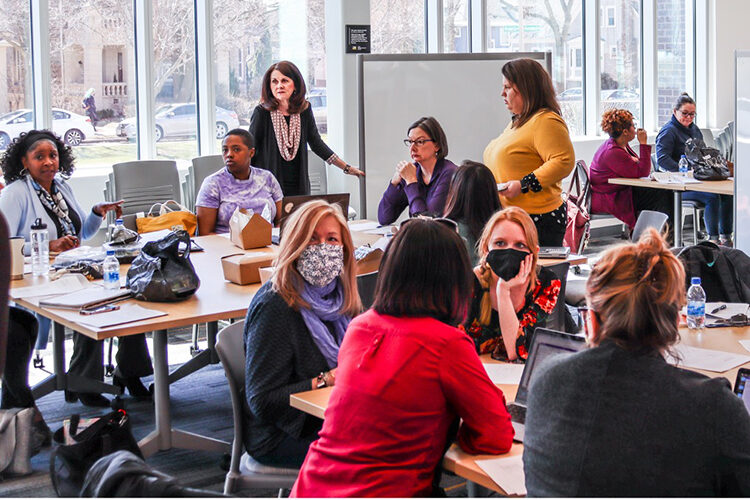Seeds of change that were planted a year ago to increase UWM’s diversity, equity and inclusion efforts are now sprouting.
The Diversity, Equity and Inclusion Action Planning Institute brought together several schools, colleges, departments and other nonacademic units in the spring of 2022 to focus on advancing efforts across the campus, according to Chia Vang, vice chancellor for diversity, equity and inclusion.
Vang led the institute along with 2030 Initiative special assistants Wikistar Otieno, associate professor of industrial and manufacturing engineering, and Rebecca Freer, associate dean of students.
UWM made a commitment to diversity, equity and inclusion in the 2030 Initiative, the university’s comprehensive plan for the next decade and beyond.
“We had a number of departments that applied to be in the institute, which speaks quite a bit to the enthusiasm that is in the departments,” said Otieno. The units involved included Educational Psychology, Facilities Planning and Management, the College of Health Sciences-Equity Alliance Committee, the Graduate School, Criminal Justice & Criminology and the Lubar College of Business.
“We wanted to have areas that were very committed, and they had to have supportive leadership,” Vang said. One other aspect of the planning was to have the involvement of a variety of people at different levels, she said.
The groups met through the spring semester in small groups, and all 30 team members came together once a month. Using data from surveys and the university’s Office of Assessment and Institutional Research, the teams decided on plans to move forward.
Not just from the top down
The schools, colleges and departments that took part in the spring institute are sharing what they’ve learned and accomplished with other areas of the university, Vang said. The DEI office continues to be available to support all efforts.
Grassroots activities are critical to DEI.
“My philosophy is that it can’t just be from the top down, just from the chancellor,” Vang said. “We want people at the unit level, at the department level, to discuss climate and culture that will ensure a sense of belonging for everyone.”
While many of the units were already engaged in DEI efforts, the institute spurred more action.
Participants said that one key outcome of the institute was being able to take the time to consider what they needed to improve and develop plans for change.
“It allowed us to set aside time for careful consideration of where the Graduate School has achieved DEI principles and where we can think about our gaps,” said Bonnie Klein-Tasman, professor of psychology and associate dean of the Graduate School.
‘You wonder where to start’
“It definitely helped with providing us some guidance because there’s so much to do,” said Karen Miyoshi, administrative manager in the College of Health Sciences and member of the college’s equity alliance commitee. “You wonder where to start.”
One key takeaway from the institute was the need to set priorities, said Klein-Tasman. “If we spread ourselves too thin and don’t engage in clear prioritization, then nothing will get done. We really need to be deliberate about what is high impact and doable, what is going to have an impact but will take more time.”
“We had been working in Facilities Planning Management on issues related to DEI – things like more inclusion and fair expectations,” said Leah Callan Stoiber, Institutional Review Board administrator in University Safety and Assurances. She was one of the leaders of that team, along with Jennifer Herriges, lab safety coordinator in the same area.
Unlike some of the other teams that took part, many employees in Facilities Management don’t work directly with students, although the area does have student employees. The team wanted to focus on the experiences of employees in Facilities Management, Stoiber said. “We wanted to participate in the institute because we felt we were at a point where we weren’t sure what to do next and how to move forward,” said Stoiber. “The DEI institute really helped us to home in on areas that should be priorities and set goals.”
Importance of collaboration
Klein-Tasman and Miyoshi emphasized the importance of collaboration in making plans and setting goals. The Graduate School has a team of faculty and staff contributing to its efforts.
The CHS equity alliance committee has three co-chairs to help ensure collaboration and input from varied perspectives. “The whole idea of being inclusive is really getting different perspectives,” Miyoshi said.
Besides racial and ethnic diversity, the team wanted representation from different employment categories.
Using data from the institute as a guide was very helpful, according to Tom LeBel, associate professor and chair of the Department of Criminology and Criminal Justice. That department, which like many of the other units had been doing DEI work before the institute, found that they were enrolling a very diverse group of students, including increased numbers of women and Hispanic students. However, many of the underrepresented students weren’t making it through to graduation.
Now the team is looking at why this is happening and finding ways to improve retention rates, LeBel said. One key is that nearly 50% of entering students are first-generation students, meaning they may face extra financial and support challenges, and are not as familiar with college requirements. One area the team is looking at is adjusting the curriculum to encourage students to stay the course and provide the best experience for them.
“Students come in and they’re all excited about taking criminal justice courses, but the way college works is you take a lot of general education courses that first year,” LeBel said. That discourages some, especially first-generation students, he said. One way to adapt the curriculum would be to add a section of the introductory course in criminal justice for all first-year majors to help build community, LeBel added. That new section will start in fall 2023.
Many ways to increase diversity
Units that went through the institute are looking at a variety of ways to increase diversity, equity and inclusion. One way: Increasing recruiting from public schools with diverse student bodies. Another example: The Graduate School has an application fee grant program for students coming from undergraduate programs and post-baccalaureate graduate school preparation programs that typically attract underrepresented students.
Programs are also looking at bringing in more instructors from underrepresented groups or inviting alumni speakers from such groups to meet with students and show what careers are possible with a college education.
“When minority students don’t see themselves represented in the faculty and staff, that sends a message,” said Dietmar Wolfram, senior associate dean and professor in the School of Information Studies.
He’s leading a team made up of representatives from the three schools that are going to be part of the new College of Community Engagement and Professions, which officially starts in July 2023. (Representatives from the departments of Educational Psychology and Criminology and Criminal Justice were part of the institute and are part of the CCEP team.)
Many units are looking at other ways to increase the focus on DEI. The Graduate School, for example, is revamping its mission statement to make sure it reflects the school’s commitment to DEI.
Amplifying existing work
Another approach is to establish or amplify the work of existing committees and groups that can give more insight into the student and staff experience. The Graduate School has a Racial Justice and Equity Graduate Student Advisory Group, made up of students who have an interest in leadership, concerns and infrastructure related to Black, Indigenous and other people of color. Klein-Tasman and Dana-María Baldwin,the Graduate School’s DEI coordinator, meet with these students regularly to discuss their ideas and concerns. Both Klein-Tasman and Baldwin are members of the school’s DEI team.
One intangible benefit of the DEI work has been better understanding and communication around the issues. The CHS equity alliance committee invited colleagues in the Zilber School of Public Health and the College of Nursing to join them for a series of educational workshops – the Culture of Racism, Recovery and Resiliency, offered through the School of Continuing Education.
“At each one of our meetings, we have a little bit of time to talk freely to one another about what’s in the news or experiences we might have had,” said Miyoshi. “It’s a place to talk openly about issues related to diversity and racism and systemic bias – those things that are hard to talk about.
“This is a safe space, and it’s OK for us to be able to say the things that are uncomfortable, and no judgment will be made,” added Yeeiliania Hamilton, administrative assistant and another member of the CHS committee. “We can all take things in and educate one another in a way that is not judgmental.”
As a number of schools and colleges realign, the DEI efforts may change, but they will continue, according to those who took part in the institute.
“I think we are all aware that it’s an ongoing process,” said Miyoshi. “It’s not just reading one book or going to one class that will do it for us. It’s always going to be evolving and growing.”






